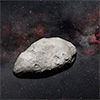 Analysis of organic compounds - called polycyclic aromatic hydrocarbons (PAHs) - extracted from the Ryugu asteroid and Murchison meteorite has found that certain PAHs likely formed in the cold areas of space between stars rather than in hot regions near stars as was previously thought.
Analysis of organic compounds - called polycyclic aromatic hydrocarbons (PAHs) - extracted from the Ryugu asteroid and Murchison meteorite has found that certain PAHs likely formed in the cold areas of space between stars rather than in hot regions near stars as was previously thought.
Dec 22nd, 2023
Read more
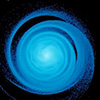 A new snapshot of an ancient, far-off galaxy could help scientists understand how it formed and the origins of our own Milky Way.
A new snapshot of an ancient, far-off galaxy could help scientists understand how it formed and the origins of our own Milky Way.
Dec 22nd, 2023
Read more
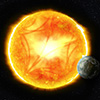 A team of astronomers has used asteroseismology, or the study of stellar oscillations, to accurately measure the distance of stars from the Earth. Their research examined thousands of stars and checked the measurements taken during the Gaia mission to study the near Universe.
A team of astronomers has used asteroseismology, or the study of stellar oscillations, to accurately measure the distance of stars from the Earth. Their research examined thousands of stars and checked the measurements taken during the Gaia mission to study the near Universe.
Dec 15th, 2023
Read more
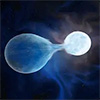 New findings confirm existence of hot helium stars long-thought to be at the heart of hydrogen-poor supernovae and neutron star mergers.
New findings confirm existence of hot helium stars long-thought to be at the heart of hydrogen-poor supernovae and neutron star mergers.
Dec 15th, 2023
Read more
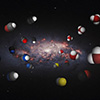 Using powerful telescopes to split two galaxies' light into individual colors, scientists were amazed to discover light from many different molecules - more than ever before at such distances.
Using powerful telescopes to split two galaxies' light into individual colors, scientists were amazed to discover light from many different molecules - more than ever before at such distances.
Dec 14th, 2023
Read more
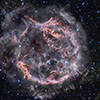 Like a shiny, round ornament ready to be placed in the perfect spot on a holiday tree, supernova remnant Cassiopeia A (Cas A) gleams in a new image from the James Webb Space Telescope.
Like a shiny, round ornament ready to be placed in the perfect spot on a holiday tree, supernova remnant Cassiopeia A (Cas A) gleams in a new image from the James Webb Space Telescope.
Dec 12th, 2023
Read more
 The extrasolar planets Kepler-1625b and Kepler-1708b are supposedly the home worlds of the first known exomoons. A new study now comes to a different conclusion.
The extrasolar planets Kepler-1625b and Kepler-1708b are supposedly the home worlds of the first known exomoons. A new study now comes to a different conclusion.
Dec 8th, 2023
Read more
 How heavy can an element be? Scientists have found that ancient stars were capable of producing elements with atomic masses greater than 260, heavier than any element on the periodic table found naturally on Earth. The finding deepens our understanding of element formation in stars.
How heavy can an element be? Scientists have found that ancient stars were capable of producing elements with atomic masses greater than 260, heavier than any element on the periodic table found naturally on Earth. The finding deepens our understanding of element formation in stars.
Dec 8th, 2023
Read more
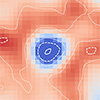 Galactic winds, observed in galaxies over 7 billion years old, play a crucial role in regulating their growth and star formation rate by facilitating matter exchange with their surroundings.
Galactic winds, observed in galaxies over 7 billion years old, play a crucial role in regulating their growth and star formation rate by facilitating matter exchange with their surroundings.
Dec 7th, 2023
Read more
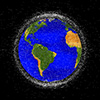 Colliding pieces of space debris emit electric signals that could help track small debris littering Earth's orbit, potentially saving satellites and spacecraft.
Colliding pieces of space debris emit electric signals that could help track small debris littering Earth's orbit, potentially saving satellites and spacecraft.
Dec 5th, 2023
Read more
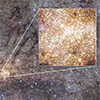 Through analysis of high-resolution data from a ten-metre telescope, researchers have succeeded in generating new knowledge about three stars at the very heart of the Milky Way. The stars proved to be unusually young with a puzzling chemical composition that surprised the researchers.
Through analysis of high-resolution data from a ten-metre telescope, researchers have succeeded in generating new knowledge about three stars at the very heart of the Milky Way. The stars proved to be unusually young with a puzzling chemical composition that surprised the researchers.
Dec 5th, 2023
Read more
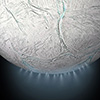 Researchers have demonstrated that amino acids within Enceladus' ice plumes can endure impact speeds up to 4.2 km/s, bolstering their detection in spacecraft sampling and supporting Enceladus as a key target in the search for extraterrestrial life.
Researchers have demonstrated that amino acids within Enceladus' ice plumes can endure impact speeds up to 4.2 km/s, bolstering their detection in spacecraft sampling and supporting Enceladus as a key target in the search for extraterrestrial life.
Dec 5th, 2023
Read more
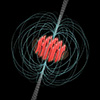 A collaboration between quantum physicists and astrophysicists has achieved a significant breakthrough in understanding neutron star glitches. They were able to numerically simulate this enigmatic cosmic phenomenon with ultracold dipolar atoms.
A collaboration between quantum physicists and astrophysicists has achieved a significant breakthrough in understanding neutron star glitches. They were able to numerically simulate this enigmatic cosmic phenomenon with ultracold dipolar atoms.
Dec 5th, 2023
Read more
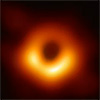 An entirely new way to probe how active black holes behave when they eat has been discovered by an international team of astronomers.
An entirely new way to probe how active black holes behave when they eat has been discovered by an international team of astronomers.
Dec 5th, 2023
Read more
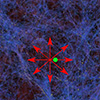 Study proposes a solution to one of the great mysteries of cosmology.
Study proposes a solution to one of the great mysteries of cosmology.
Dec 2nd, 2023
Read more
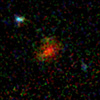 It first appeared as a glowing blob from ground-based telescopes and then vanished completely in images from the Hubble Space Telescope. Now, the ghostly object has reappeared as a faint, yet distinct galaxy in an image from the James Webb Space Telescope.
It first appeared as a glowing blob from ground-based telescopes and then vanished completely in images from the Hubble Space Telescope. Now, the ghostly object has reappeared as a faint, yet distinct galaxy in an image from the James Webb Space Telescope.
Dec 2nd, 2023
Read more
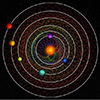 Scientists have discovered a rare sight in a nearby star system: Six planets orbiting their central star in a rhythmic beat. The planets move in an orbital waltz that repeats itself so precisely it can be readily set to music.
Scientists have discovered a rare sight in a nearby star system: Six planets orbiting their central star in a rhythmic beat. The planets move in an orbital waltz that repeats itself so precisely it can be readily set to music.
Nov 29th, 2023
Read more
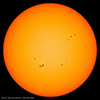 Scientists have discovered a new relationship between the Sun's magnetic field and its sunspot cycle, that can help predict when the peak in solar activity will occur. Their work indicates that the maximum intensity of solar cycle 25, the ongoing sunspot cycle, is imminent and likely to occur within a year.
Scientists have discovered a new relationship between the Sun's magnetic field and its sunspot cycle, that can help predict when the peak in solar activity will occur. Their work indicates that the maximum intensity of solar cycle 25, the ongoing sunspot cycle, is imminent and likely to occur within a year.
Nov 28th, 2023
Read more
 Analysis of organic compounds - called polycyclic aromatic hydrocarbons (PAHs) - extracted from the Ryugu asteroid and Murchison meteorite has found that certain PAHs likely formed in the cold areas of space between stars rather than in hot regions near stars as was previously thought.
Analysis of organic compounds - called polycyclic aromatic hydrocarbons (PAHs) - extracted from the Ryugu asteroid and Murchison meteorite has found that certain PAHs likely formed in the cold areas of space between stars rather than in hot regions near stars as was previously thought.
 Subscribe to our Space Exploration News feed
Subscribe to our Space Exploration News feed















